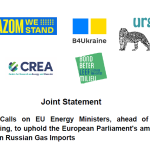Some market fundamentalists make that a simple price on carbon (i.e. an ETS) can fix everything. This is simply wrong, has been proven wrong by many studies and it will remain wrong no matter how often this myth is repeated.
The price of carbon can change some things but not all…. So called market failures, e.g. “irrational” behavior, split incentives, technological and other barriers make life and economics much more complicated than some economists, ETS enthusiasts and market fundamentalists would like us to believe.
A simple example: why don’t you go out and buy a new fridge that is much more efficient than your old one and will pay for itself in 3 years? Well, maybe you are planning to move, or don’t have the money, or don’t have the time, or don’t know or simply cannot be bothered because there are more important things than thinking about fridges.
This is why we need many different polices that can address these different “market failures” (and to convince you why buing a super energy efficient fridge is worthwhile).
Here some recent research on why a policy bouquet is necessary to effectively reduce emissions:
- If you have only little time, read this blog in The Economist
- OECD: Aligning Policies for a Low-carbon Economy
- Climate Strategies and others: What does the European Power sector need to decarbonize? The role of the EU ETS and complementary policies post-2020
- CECILIA2050 has several publications that look at this, see here
- For a whole book, see: Planetary Economics & Energy, climate change and the three domains of sustainable development
And why do some economists still hang on to this myth of a price that can fix everything? Oh because life would be so much nicer and simpler if it followed the basic theoretic principles of economics. But life is messy and so is climate politics and climate protection. Policy solutions that work in the abstract may turn out to be useless in the real world. This is why there will never be a silver bullet but there are many beautiful solution bouquets!



